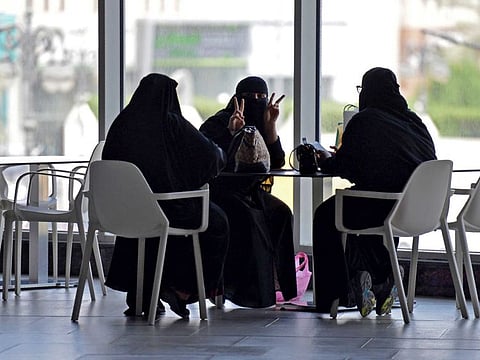Saudis investigate message imposing veil at Khalid University
Dress code stirs controversy on social media in Kingdom

Abu Dhabi: A teacher atthe College of Nursing at King Khalid University ordered students to wear a black face-covering veil among other clothes in violation of regulations respecting the freedom of Saudi women.
The move prompted an investigation in the university after it drew the ire of the students — who were also ordered to wear a black skirt, trousers under the skirt — and widespread controversy on Twitter.
Twitter users launched the Arabic hashtag #University_ Khaled_Forces_ Female Students, and called for the cancellation of the dress code that contradicts the new public decency code.
In 2019, Saudi Arabia adopted new regulations stipulating that men and women are required to dress modestly, refrain from public displays of affection, and avoid using profane language or gestures.
Under the rules, women are required to dress modestly, meaning cover their shoulders and knees.
The hashtag ranked second in the Kingdom, with more than 5,000 tweets by female leaders as of Tuesday, denouncing the move.
The author, Dr. Azza Al Subaie, said the decision that appeared in the media claiming to be by King Khalid University, should be confirmed.
“We witness every day the state’s respect and confidence in veiled women, and we have not seen any discrimination based on women’s choices or calls for punishment, because they chose not to cover their faces,” Al Subaie said.
King Khalid University’s spokesperson, Dr. Mufleh Al Qahtani, said what was circulated was sent by a faculty member of the College of Nursing in Khamis Mushait via the blackboard system, andwasfar from official.
Al Qahtani added what wascirculated did not represent the official procedures at the university, nor did it reflect the reality of female students in training bodies, indicating that the university’s regulations are consistent with the public decency code.
He said the university would be taking action.
Dr. Wafa Al Rasheed said: “Even if it was an individual choice by a faculty member without returning to the university, this was an excuse greater than a sin that reflected the extent of administrative slackness.
“I hope the necessary action will be taken by the Ministry of Education and the university, because we are in a stage of construction, work and diligence, and this stage does not tolerate excesses, so the state’s direction is clear in empowering women and preserving their status and dignity, in line with their local, global and religious rights, and those who violate the approach must quit from their responsibilities and sit on the reserve chair,” Al Rasheed said.






